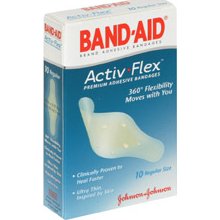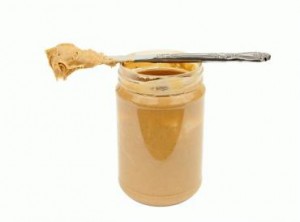June 12th, 2012 by Dr. Val Jones in Health Tips, True Stories
1 Comment »
 I’m a dermatologist’s dream – a fair-skinned, freckly person with lots of small moles. The perfect candidate for a lifetime of 6-month skin checks!
I’m a dermatologist’s dream – a fair-skinned, freckly person with lots of small moles. The perfect candidate for a lifetime of 6-month skin checks!
Luckily for me, none of my moles have ever been cancerous. To be honest (please look the other way, dermatologist friends) I have sometimes put off skin checks for fear of being invited to undergo yet another biopsy. I’ve had about 9 procedures so far, and I have the scars to prove it. But this time around, I found a product that really reduced my healing time and scarring. I’m so excited about the results that I don’t care if I need a total-body shave biopsy next year. Bring it on! No one will be able to tell.
It is a little surprising that hydrocolloid gel technology hasn’t been on the consumer market for all that long (I wasn’t able to figure out when this product was launched in retail stores but it seems to me that I’ve only seen it around for the last few years or so). Hydrocolloid dressings are a staple in wound healing in the hospital setting, and I’ve seen marvelous results with pressure ulcer repair in the hands of experienced wound care nurses. The gel essentially creates a moist scaffold for skin cells to fill in defects and divots. The gel absorbs moisture from the skin and wound “oozing” while creating a sterile barrier against dirt and germs. The scab-less healing creates minimal scar tissue and the bandage is hypo-allergenic and incredibly flexible.
The product I used is called ActivFlex premium adhesive bandages (a Johnson & Johnson Band-Aid brand). I’ve seen generic knock-offs on store shelves but haven’t tried them. All I can say is that the experience has been terrific, and it’s such a relief to know that I don’t need to worry about scars from small cuts, burns, or mole biopsies any more. This is a fantastic invention – and I’d love to hear from others (be they dermatologists, plastic surgeons, or regular users of the product) to find out if they’ve had the same luck!
No need to fear skin checks anymore, my fair-skinned friends. You can recover nicely from procedures with a little hydrocolloid help from your local grocery store or pharmacy.
June 11th, 2012 by Dr. Val Jones in Health Policy, Opinion
1 Comment »
 I don’t read The Economist frequently enough to be sure that I dislike its entire staff of writers, but I have been repeatedly disappointed by its health coverage. In this latest article, “Squeezing Out The Doctor” the writers describe the increased healthcare needs of an aging western civilization, combined with a relative shortage of physicians to care for seniors. The conclusion? This is a “win” for patients.
I don’t read The Economist frequently enough to be sure that I dislike its entire staff of writers, but I have been repeatedly disappointed by its health coverage. In this latest article, “Squeezing Out The Doctor” the writers describe the increased healthcare needs of an aging western civilization, combined with a relative shortage of physicians to care for seniors. The conclusion? This is a “win” for patients.
Now, in case you find that conclusion as irrational as I did, let me summarize how they arrived there. The argument goes something like this: doctors have been unfairly controlling the practice of medicine for the past century, and now with the oncoming flood of patient need (and relative MD shortage), they won’t have time to do everything they have in the past. Physicians will therefore be forced to narrow their scope and outsource many of their current tasks to nurses and support staff. This is a win for patients because they will have shorter wait times for care and lower healthcare costs with the same care quality because most of what doctors do can be replicated by ancillary staff. At last we will be able to remove the self-important, over-educated, control freak physicians from the delivery of healthcare!
Oh, here’s another great idea: why don’t we improve our school systems by squeezing out the teachers? Who needs teachers when mature students could train others in the same subject matter? Most of what teachers do is just baby sitting, right? We could easily outsource that to daycare centers or teens with a little baby sitting experience. The few teachers we retain should be reserved for only the most difficult cases: severe learning disabilities. Just think of the cost savings in teacher salaries! Imagine the improved access to schools if we didn’t have to adhere to some arbitrary teacher to student ratio. What a win for students. The only possible downside is that teachers may lose some of their current social standing, but so what?
The oncoming physician shortage will not bring the glorious improvements in healthcare delivery touted by The Economist. More likely it will create a two-tiered system whereby the poor and underinsured will get a substandard level of care. If you think that only doctors balk at long hours for low pay, try pitching that deal to nurses. They are just as savvy as physicians about personal economics. Having them take over primary care under the current (or worsening conditions) will burn them out just as quickly and nurses will specialize or quit nursing in droves. There is no magical, “let’s just get someone else to do it for less” model in healthcare when we’re already scraping the bottom of the barrel in terms of ROI for providers of any stripe.
Physician scarcity can be ameliorated by setting doctors free to spend more of their time in patient care, and less of it on distractions (such as excessive documentation for coding and billing purposes). But the solution is not necessarily outsourcing that work to someone else. It’s killing it all together. Radical idea? My practice is doing that now and growing a thriving business to boot.
Primary care doesn’t have to be expensive. Most patients need less than a full hour of a physician’s time per year, an annual cost of about $350. In my practice, we bill for our time and we spend it however it makes best sense for the patient – via phone, email, office visit, or house call. It’s in our interest to see as many patients as possible, and therefore we are increasing access to services. Office wait times are non-existent because many issues can be handled via phone (patients are not required to come to the office for every and any request for the sake of billing).
What’s the catch? We don’t accept insurance. Patients can submit claims to their carrier for reimbursement for our out-of-network services, but we have opted out of public and private insurance plans so that we can spend our time with patients instead of coding, billing, and being beholden to third party documentation requirements and regulations. This system works marvelously for any patient open-minded enough to see that a high deductible health insurance plan (for catastrophic coverage only) saves them thousands per year in premiums, while their primary care “out of pocket” will cost a few hundred or less. The math works for all. Access is improved, costs decrease, quality is maintained.
Now that’s a true win for patients.
June 9th, 2012 by Dr. Val Jones in Health Policy, Opinion, True Stories
1 Comment »
 A patient was having difficulty swallowing her pills, so her doctor suggested that she might try peanut butter to help the medicine go down. Unbeknownst to the doctor, the patient assumed that this meant that she should mix all her prescription meds into a jar of peanut butter and scoop out a spoonful each day to spread on her toast at breakfast time. This practice was discovered during a home visit by a nurse a few weeks later, who relayed the potential “compliance issue” to the patient’s physician.
A patient was having difficulty swallowing her pills, so her doctor suggested that she might try peanut butter to help the medicine go down. Unbeknownst to the doctor, the patient assumed that this meant that she should mix all her prescription meds into a jar of peanut butter and scoop out a spoonful each day to spread on her toast at breakfast time. This practice was discovered during a home visit by a nurse a few weeks later, who relayed the potential “compliance issue” to the patient’s physician.
Clearly peanut butter is a sub-optimal storage mechanism for prescription medications, and dosing will likely present a challenge in this scenario… However the real message for me is that home visits are critical to understand how (and what) our patients are doing. All the claims data in the world is a poor substitute for the information that can be gathered in a simple house call.
Health insurance companies have gotten this message. Last month I began working for an agency that helps private insurers risk-adjust their Medicare Advantage client pool. In short, private health insurance companies contract with the feds to cover richer benefits for Medicare members who wish to kick in a little extra in premium. The government subsidizes this premium for the members based on their illness severity score (the sicker the patient, the higher the rate paid to private insurers to cover them).
But who knows how sick these members are? Health insurance claims data (diagnosis codes collected over the course of a patient’s lifetime) don’t correlate well with actual illness and current conditions, nor are these codes easy to get one’s hands on in the first place. Multiple previous carriers, incomplete medical records, various specialist physicians with paper charts or EMRs (that don’t talk to one another) all contribute to the poor data quality. So, as expensive a proposition as this is, private insurers are paying independent physicians to make house calls to tease out what’s actually going on with patients.
This process has been eye-opening for me in ways I hadn’t anticipated. First of all, I have a much better sense of how older Americans are actually living their lives by visiting them in their homes. I’ve gotten to know about the importance of family, the value of good caregivers, and the surprising lack of correlation between wealth and happiness. Second, I’ve gotten a sense of primary care quality in rural settings, and how communication break downs occur between patients and physicians. And third, I’ve developed an even deeper appreciation for the complexity of keeping people out of the hospital. Even the most well-intended advice can be “operationalized” in strange and wonderful, peanut-buttery ways.
I thought it might be helpful if I shared my experiences with you via my blog (patient privacy respected always, of course), so that we can explore the intersection between real life scenarios (discovered during house calls) and potential health policy. So stay tuned for more… 😆
June 8th, 2012 by Dr. Val Jones in Announcements
3 Comments »
 I started medical blogging in 2006, and posted something new every day for over two years straight. I met some terrific fellow bloggers in those “early years”, and soon wondered if we might reach a larger audience if we pooled some of our blog content. This blog site (Better Health) was born in October 2008, and soon grew to have over 130 contributors! We developed a large following on Facebook and Twitter and partnered with such prestigious organizations as the CDC, Harvard Health Publications, and the American College of Physicians. We actually grew so large so fast that I had to hire a small staff to help me run the blog… Which became logistically challenging and pretty expensive, rather quickly!
I started medical blogging in 2006, and posted something new every day for over two years straight. I met some terrific fellow bloggers in those “early years”, and soon wondered if we might reach a larger audience if we pooled some of our blog content. This blog site (Better Health) was born in October 2008, and soon grew to have over 130 contributors! We developed a large following on Facebook and Twitter and partnered with such prestigious organizations as the CDC, Harvard Health Publications, and the American College of Physicians. We actually grew so large so fast that I had to hire a small staff to help me run the blog… Which became logistically challenging and pretty expensive, rather quickly!
Because Better Health has always been a labor of love, and not a well- oiled, monetization machine, I eventually had to close the doors. It broke my heart. It was such a shame that a collection of the best medical blog writing just couldn’t be supported financially – at least I couldn’t find a way to do so! In January 2012 I posted a farewell note and decided to continue my social media life on Twitter and Facebook instead.
A few days ago I noticed a large uptick in Twitter followers and was surprised to see that I had been recommended (by Healthcare IT News) as one of the top 10 physicians to follow on Twitter. In the article it commended my work as a Better Health blogger… the blog that I had recently shuttered.
I had been toying with the idea of starting a personal blog again because I found it rather challenging to say all I wanted in only 140 characters, and this new influx of followers gave me food for thought. What if I just keep it simple this time? What if I write blog posts at Better Health when the spirit moves (instead of feeling pressured to post something every day or to include 100’s of others in my blog posts?)
So that’s what I’m going to do. This is just me again – the way it all began. But without any regard for traffic, numbers, or popularity. Maybe only a handful of people will read my posts here. And that’s ok with me! So welcome back to the OLD new me. The cycle is complete?
P.S. I will continue to blog at Healthline to educate patients about their eyes, and I also hope you’ll listen in to my Healthy Vision radio show. Or follow @drval on Twitter?
January 7th, 2012 by Dr. Val Jones in Announcements
4 Comments »
 Dear Better Health Friends & Contributors,
Dear Better Health Friends & Contributors,
2012 will mark Better Health’s 4th year anniversary of group medical blogging. I began Better Health with the hope of organizing “voices of reason” in the health blogosphere so that our ideas would enjoy greater circulation and be more influential. We were the early adopters of social media – some of the first physicians, nurses, patient advocates, and scientists to join together to provide trustworthy content to our readers via blogs. We grew to represent over 130 bloggers and, over the years, were joined by such prestigious organizations as the American College of Physicians, Harvard Health Publications, Diario Médico, and the Centers For Disease Control And Prevention. I am proud of our excellent writing, and I know that we touched many lives through our blogging.
Many of our contributors have enjoyed such success in blogging that they are regular features of several publishing platforms. Others have gone on to careers in social media education and are now sought-after speakers across the U.S. and beyond. Today’s blog audiences often receive their health information via personalized “filters” on Facebook and Twitter, rather than specific websites. And so for these reasons, Better Health has achieved its purpose to promote medical bloggers. I will discontinue future publication of blog posts at the getbetterhealth.com website as of today. Better Health, LLC will continue on as my personal consulting company.
I want to thank you all for contributing content to Better Health – I have personally enjoyed reading your work and I wish you success in your future writing endeavors. As I look forward to the next chapter of my life I hope to remain in touch with you all via email, Facebook (/drvaljones) or Twitter (@drval).
Please note that Grand Rounds will continue as usual, and that the getbetterhealth.com website will remain in archive format indefinitely.
With all my best for 2012,
Val
P.S. I will continue to promote medical blogging via Grand Rounds, and I will be hosting it at USA Today in the near future (date TBD). Please stay tuned for submission information. The Grand Rounds calendar will remain updated at the top of the Better Health home page indefinitely.
 I’m a dermatologist’s dream – a fair-skinned, freckly person with lots of small moles. The perfect candidate for a lifetime of 6-month skin checks!
I’m a dermatologist’s dream – a fair-skinned, freckly person with lots of small moles. The perfect candidate for a lifetime of 6-month skin checks!

 I don’t read The Economist frequently enough to be sure that I dislike its entire staff of writers, but I have been repeatedly disappointed by its health coverage. In this latest article, “
I don’t read The Economist frequently enough to be sure that I dislike its entire staff of writers, but I have been repeatedly disappointed by its health coverage. In this latest article, “ A patient was having difficulty swallowing her pills, so her doctor suggested that she might try peanut butter to help the medicine go down. Unbeknownst to the doctor, the patient assumed that this meant that she should mix all her prescription meds into a jar of peanut butter and scoop out a spoonful each day to spread on her toast at breakfast time. This practice was discovered during a home visit by a nurse a few weeks later, who relayed the potential “compliance issue” to the patient’s physician.
A patient was having difficulty swallowing her pills, so her doctor suggested that she might try peanut butter to help the medicine go down. Unbeknownst to the doctor, the patient assumed that this meant that she should mix all her prescription meds into a jar of peanut butter and scoop out a spoonful each day to spread on her toast at breakfast time. This practice was discovered during a home visit by a nurse a few weeks later, who relayed the potential “compliance issue” to the patient’s physician. I started medical blogging in 2006, and posted something new every day for over two years straight. I met some terrific fellow bloggers in those “early years”, and soon wondered if we might reach a larger audience if we pooled some of our blog content. This blog site (Better Health) was born in October 2008, and soon grew to have over 130 contributors! We developed a large following on Facebook and Twitter and partnered with such prestigious organizations as the CDC, Harvard Health Publications, and the American College of Physicians. We actually grew so large so fast that I had to hire a small staff to help me run the blog… Which became logistically challenging and pretty expensive, rather quickly!
I started medical blogging in 2006, and posted something new every day for over two years straight. I met some terrific fellow bloggers in those “early years”, and soon wondered if we might reach a larger audience if we pooled some of our blog content. This blog site (Better Health) was born in October 2008, and soon grew to have over 130 contributors! We developed a large following on Facebook and Twitter and partnered with such prestigious organizations as the CDC, Harvard Health Publications, and the American College of Physicians. We actually grew so large so fast that I had to hire a small staff to help me run the blog… Which became logistically challenging and pretty expensive, rather quickly! Dear Better Health Friends & Contributors,
Dear Better Health Friends & Contributors,







